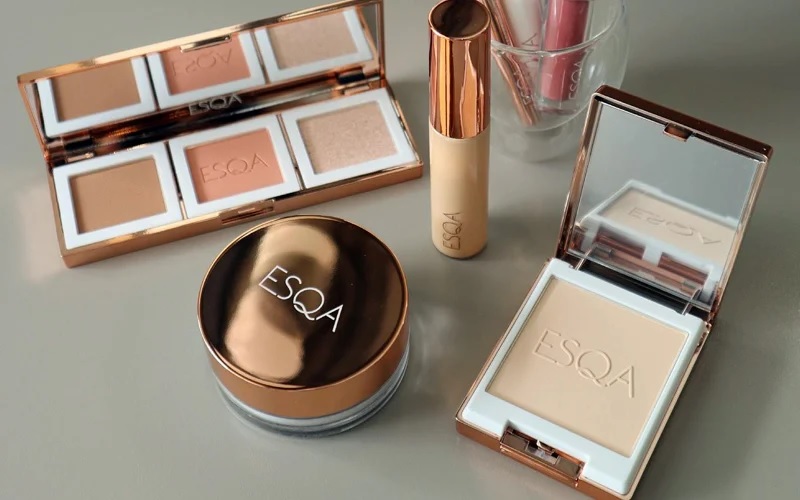Indonesian cosmetics brands see opportunity in halal products
Published on: Tuesday, December 27, 2022
By:
Nikkei, FMT
Text Size:
Indonesian beauty brand Esqa offers halal-certified makeup with vegan ingredients. (FB/Esqa)
JAKARTA: Companies offering halal cosmetics in Indonesia, the world’s largest Muslim-majority country, are aiming to boost the international appeal of their products in Southeast Asia and beyond as they see potential in attracting more non-Islamic consumers.
In 2014, Indonesia enacted a law requiring halal certification for a wide range of consumer products sold in the country. The new “halal product assurance” regulations will be obligatory for cosmetics by 2026. Being certified as halal means products are manufactured in compliance with Islamic law and contain no forbidden ingredients.
ADVERTISEMENT
Consumers, especially millennials and Generation Z, are seen as increasingly becoming more knowledgeable regarding what ingredients go in each product as well as general safety.
“People used to think that halal brand was for Muslims only, but now everyone chooses it mainly for health reasons,” Kezia Trihatmanto, co-founder of Indonesian beauty brand Esqa, told Nikkei Asia.
Keva Cosmetics International, owner of the Esqa brand, offers halal-certified makeup with vegan ingredients. Although starting in Indonesia, Trihatmanto said, “we created Esqa in 2016 as a halal beauty brand that is up to par with the global cosmetics scene”.
Esqa has expanded into other Southeast Asian markets, including Vietnam, Singapore and Malaysia, and aims in the near future to go beyond the countries where it currently operates. Besides offering products online, the brand is also sold at stores such as Indonesia’s Sociolla, Sephora of France and Hong Kong-based Watsons. Despite the coronavirus pandemic, Esqa is expected to be profitable this year, as it also was in 2021.
ADVERTISEMENT
According to market insight provider Precedence Research, the global halal cosmetics market amounted to US$45.32 billion in 2022 and is expected to more than triple to around US$162 billion by 2030, thanks to the increased purchasing power of the growing female Muslim population.
Trihatmanto pointed out that halal certification is a strength for beauty brands “because healthy ingredients are now one of the top considerations for customers when they purchase cosmetic products”.
ADVERTISEMENT
She also said the “halal certificate should not only be about religion; it is supposed to be an industry standard which we think is relevant to all consumers, regardless of religion”.
Angela Cahyanti, 28, is one non-Muslim sold on the products.
“I use halal cosmetics and skin care mainly because they are high-quality local products with an affordable price,” said the 28-year-old homemaker from Bekasi in West Java province. “I initially never cared about halal certification because it might be the same as food or drinks, which doesn’t affect me as a Christian. But when I compared them with nonhalal products, especially imported cosmetics and skin care, these local halal products are better.”
Yaumi Fauziah Sugiharta, co-founder and CEO of Base, another Indonesian vegan cosmetic brand, agrees with Trihatmanto. “We see vegan and halal beauty products gaining a growing interest in the market with a less Muslim population, say in Australia, as the products containing vegan or plant-based ingredients have a strong association with an organic, natural product that is gentle yet with an effective result on skin.”
But Sugiharta also underscored the importance of Muslim consumers.
“The demand for halal cosmetic products will continue to increase due to the increase in the purchasing power of the population, the increasing number of Muslims and also the desire of the Muslim community to associate their interest in cosmetic products that adhere to religious loyalty,”
In Indonesia, beauty startups are increasingly raising funds from foreign investors. Esqa in November raised US$6 million, led by consumer giant Unilever and venture capital firm East Ventures, while Base announced in the same month that it had raised US$6 million from investors including Rakuten Ventures.
“There is a growing demand for high-quality, hyperlocal and affordable beauty products, and we are certain that Esqa’s innovative, natural ingredients and wide product offerings will propel Esqa to be a leader in the beauty market in Southeast Asia,” said Avina Sugiarto, partner at East Ventures.
According to Euromonitor data, Indonesia’s overall cosmetics market – the largest in Southeast Asia – surpassed Thailand’s in 2021 and is expected to reach US$11 billion in 2026, up 54% from 2021.
With female purchasing power on the rise, more consumers are spending more on cosmetics than ever, and also are gaining knowledge on social media. Though Japanese brands like Shiseido are more focused on the high-end sector, South Korean cosmetics companies are leveraging the popularity of their country’s dramas and K-pop music to tap into Southeast Asia’s biggest economy.
With demand for halal-certified goods and services growing in Asia – home to over 60% of the world’s Muslim population – foreign companies are also gearing up to cash in.
Japanese trading company Marubeni and drug and cosmetics store operator Ain Holdings opened their first Ainz & Tulpe outlet in May in Malaysia, where more than half of the population is Muslim.
The store currently does not stock halal products but is considering offering them if there is sufficient demand, a Marubeni representative told Nikkei. The joint venture is also looking at expanding into other Southeast Asian countries such as Singapore and Indonesia.
* Follow us on Instagram and join our Telegram and/or WhatsApp channel(s) for the latest news you don’t want to miss.
* Do you have access to the Daily Express e-paper and online exclusive news? Check out subscription plans available.
